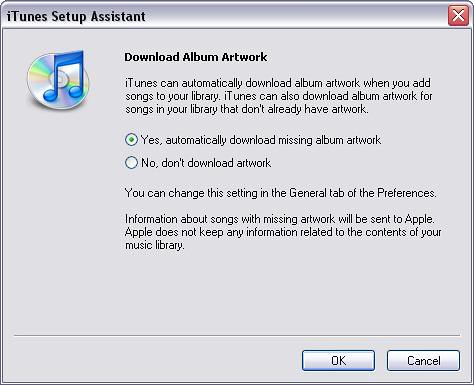After posting a fairly positive commentary on the Zune player it pains me to say that it looks like Microsoft’s willingness to compromise its technology in order to satisfy the increasingly shrill demands of the content industry means that the player will be significantly less interesting or useful than it first seemed.
Welcome to the Zuniverse?
[As ever, you can read this on the BBC News website]
Now that Microsoft has announced the players, accessories and online store that make up its Zune music service we can begin to see how it stacks up against the iPod and other MP3 players.
The player has a 30Gb hard drive, much smaller than the top of the range iPod with its 80Gb of storage, but it will no doubt grow. It’s got a larger 3-inch screen, a built in FM radio tuner, and comes in three colours: white, black and brown.
Getting it right
I’ve just downloaded and installed the new release of iTunes, 7.0. It comes with Cover Flow which lets you flip through album covers – I’d used an early version on my Mac and it’s extremely nice. But of course getting artwork means iTunes needs to know what you’ve got in your library – and tell Apple… but it seems that Apple have learned their lesson from the experience with the Ministore..

Blogged with Flock
Who can you trust?
[As ever, you can read this on the BBC News website too]
Most of the discussions about Craigslist, the phenomenally successful classified advertising website that started over ten years ago in the US, focus on the job ads and accommodation listings and how they are challenging existing advertisers.
But the site is also used extensively for personal ads of all sorts, including many from people looking for sex with no complications.
The ads, some of them very explicit, can be found in the ‘casual encounters’ area of the personals section, behind a warning notice designed to deter children or the easily offended.
Continue reading “Who can you trust?”
Converses and Parliament
Max and I were in London yesterday, and after watching Arsenal draw 1-1 against Middlesbrough (see the comment below!) we took a trip on the London Eye just as the light was beginning to fade. Excellent views…
I want my XNA…
[As usual, this is also on the BBC News website]
I used to be a programmer, working for a small software house in Cambridge on the development of a database management system. I wrote programs in C, running on a multi-user Unix-based system that supported sixteen dumb terminals with half a megabyte of main memory and, if I remember correctly, a ten- or twenty-megabyte hard drive.
They were happy days, even if the entire office was running from a system less powerful than my swanky new XDA mobile phone with its two gigabyte memory card, and I still describe myself as a programmer sometimes, mostly when I want people to leave me alone at parties.
Continue reading “I want my XNA…”
Modern Times
I’m getting older, if not old – 46 next birthday, and starting to feel it in my joints and show it with my white beard. But the new Dylan album makes me feel that the whole thing is bearable, that age and experience have their merits and that if you can rhyme, sneer and laugh at it, regret some of it and keep a sardonic distance from the rest, then it won’t be too bad.
He’s the man. He tells it like it is. Well, as it is for me….
I keep thinking about you, baby. And I can’t hardly sleep.
Speaking Truthiness to Wikiality
[truthiness: http://en.wikipedia.org/wiki/Truthiness]
My article [available here on the blog or here on the BBC] about Wikipedia and the plans by the German edition to put new editorial controls in place on their edition on the site seems to have been taken by some of those involved as an attack on the site and its philosophy, at least if the postings to the English-language mailing list WikiEN-l are typical. This is a shame, since I’m on their side and thought that what I’d written was supportive, although definitely not sycophantic. Unfortunately it seems that anything less than complete approval of whatever happens inside the Wikimedia Foundation is an act of treachery, so you’d better mark me down as an apostate and draft the fatwa…
Continue reading “Speaking Truthiness to Wikiality”
What can you say in one hundred words?
For the last three months I’ve been working as tame geek and online advisor for two friends who have a fantastic project built around writing and producing plays with one hundred words, and doing them in English and Chinese (Mandarin) as part of a wider cross-cultural programme.
The site – and blog – is at http://www.100wordplay.com/, and this week the first UK-based events take place at London’s Soho Theatre, in conjunction with the National Youth Theatre. So if you happen to be around Soho this evening and are looking for something to stimulate the palate, let me recommend this:
From 28th August to 2nd September, at 8.30pm in the Studio, writers
from Soho Theatre and the National Youth Theatre will create and
perform a 100 word play that captures the essence and speed of youth.
wordplay » Blog Archive » Working with the National Youth Theatre
(and while I may eventually get some money for my work on the site and general advice, so far it’s been pro bono, so I won’t make anything from ticket sales!)
Blogged with Flock
Dead trees for the rich

Roy Greenslade notes the debate prompted by The Economist’s attempt to understand what is happening in the newspaper world, and refers to a piece on Today earlier this week:
Here is the response to The Economist by two editors: Alan Rusbridger of The Guardian and Simon Kelner of The Independent, talking on this morning’s Today programme. Rusbridger agreed that not all newspapers would survive because “there is a disaggregation of advertising from editorial… a fragmentation of audience… competition from free sheets.” He did, however, have faith that revenue could be earned online. Kelner does not accept that papers will die, but to survive they must innovate. As for income, he believes cover prices must increase to compensate for the falling take from advertising. (Via BBC Radio 4)
Rusbridger and Kelner on The Economist from Greenslade
Kelner’s Independent has always had an appalling attitude to the Web, and it’s not surprising that he continues to believe that papers can survive since that is the only world he knows. And I have said for many years that the dead tree editions will be reserved for the wealthy, willing to pay vast amounts to have a printed newspaper instead of one on digital paper. I can’t claim credit for the insight, though – I got it from Neal Stephenson’s The Diamond Age, published in 1995 and read by me when I was right in the middle of my time at The Guardian’s New Media Lab.Blogged with Flock


